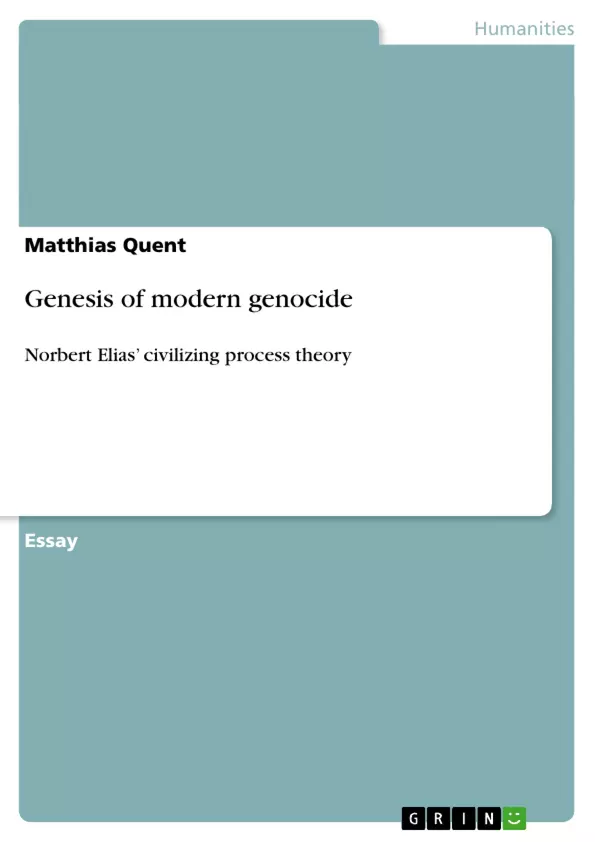The phrase that the 'civilized Western World' has to defence its values even by using physical violence is often mentioned by politicians and media makers. Especially the 'war on terror' draws a picture of the necessity of the West's force against the 'barbarism', which seems to menace the 'civilized' order. In fact that seems to be a contradiction in terms. How can underdeveloped, 'uncivilized' and uneducated people be able to menace the countries with the world most developed technologies and the highest standard of 'civilization', as it’s often is said? Norbert Elias presents a theory of the civilizing process which includes the opinion, that a lot of things, which a member of the present-day Western civilized society esteems 'uncivilized' in other societies today, can be found in past epochs of his own society, like the medieval-feudal period. The key question to understand on the one hand the civilizing process itself and the problem of the so called 'breakdown of civilization' even in modern states on the other hand is how the civilizing of the West actually did happen?
Inhaltsverzeichnis (Table of Contents)
- Genesis of modern genocide
- Norbert Elias' civilizing process theory
- Elias' understanding of civilization
- Duerr's critique of Elias
- Elias' theory of the civilizing process
- Sociogenesis and psychogenesis
- Monopolization of force and the state
- The civilizing process and its counter-current
- Rationalization, bureaucratisation, and mass murder
- Coping mechanisms and the potential for recurrence
- Genocide as the core of modernity
- Germany's unique context
Zielsetzung und Themenschwerpunkte (Objectives and Key Themes)
This text examines Norbert Elias's theory of the civilizing process and its relevance to understanding modern genocide. It aims to analyze Elias's concept of civilization, explore critiques of his work, and investigate the relationship between the civilizing process and the capacity for organized violence within modern states.
- Norbert Elias's theory of the civilizing process
- The relationship between civilization and violence
- The role of the state in monopolizing force
- The critique of Elias's work by Hans Peter Duerr
- The application of Elias's theory to the Holocaust
Zusammenfassung der Kapitel (Chapter Summaries)
Genesis of modern genocide: Introduces the apparent paradox of a "civilized" West resorting to violence, setting the stage for Elias's theory.
Norbert Elias' civilizing process theory: Outlines Elias's sociological approach, contrasting it with traditional philosophy, and emphasizing his focus on the long-term changes in behavior and affect within Western societies.
Elias' understanding of civilization: Explains Elias's nuanced view of civilization, avoiding simplistic notions of progress or decline.
Duerr's critique of Elias: Presents Hans Peter Duerr's counter-argument, which challenges the Eurocentric implications of Elias's theory and accuses Elias of misinterpreting historical sources.
Elias' theory of the civilizing process: Delves deeper into Elias's central argument, highlighting the intertwined concepts of sociogenesis and psychogenesis.
Sociogenesis and psychogenesis: Explains the interplay between societal and individual processes of civilizing.
Monopolization of force and the state: Discusses the crucial role of state-monopolized force in shaping social behavior and the potential for its misuse.
The civilizing process and its counter-current: Explores how the civilizing process can paradoxically lead to outbreaks of extreme violence, using Nazi Germany as a prime example.
Rationalization, bureaucratisation, and mass murder: Analyzes how rationalization and bureaucratisation facilitated the industrialized nature of the Holocaust.
Coping mechanisms and the potential for recurrence: Examines societal coping mechanisms in relation to mass murder, cautioning against complacency and the need for understanding the underlying societal factors.
Genocide as the core of modernity: Presents a contrasting perspective that views genocide as inherent to modernity.
Germany's unique context: Discusses the specific historical and socio-political context of Germany that contributed to the Holocaust.
Schlüsselwörter (Keywords)
Civilizing process, Norbert Elias, genocide, Holocaust, state violence, monopolization of force, sociogenesis, psychogenesis, rationalization, bureaucratisation, Hans Peter Duerr, modernity, mass murder.
Frequently Asked Questions
What is Norbert Elias's "Civilizing Process" theory?
It describes the long-term change in human behavior and personality toward greater self-control and the reduction of physical violence in public life.
How can a "civilized" society commit genocide?
The thesis explores how modern rationalization and bureaucratization can paradoxically facilitate industrialized mass murder, as seen in the Holocaust.
What is the role of the state in the civilizing process?
The state centralizes and monopolizes the use of physical force, which forces individuals to resolve conflicts through non-violent, regulated means.
What is Hans Peter Duerr's critique of Elias?
Duerr argues that Elias's theory is Eurocentric and misinterprets historical sources regarding the behavior of "uncivilized" peoples.
What are "sociogenesis" and "psychogenesis"?
Sociogenesis refers to the development of social structures (like the state), while psychogenesis refers to the corresponding change in individual psychological structures.
- Quote paper
- Matthias Quent (Author), 2008, Genesis of modern genocide, Munich, GRIN Verlag, https://www.grin.com/document/124325



